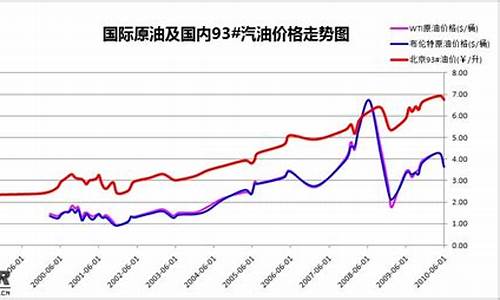油价上涨怎么表达_油价上涨用英语怎么说
1.英语阅读:4-Could the bad old days
2.英语翻译
3.关于英语非谓语,如图,第24题,为什么填decreasing而不是decreased?这里的独立主

The days ahead
未来的日子
例句:
1、It's a toss-up whether oil prices will go up or down over the days ahead.?
油价在今后的日子里会上涨还是下跌都有可能。
2、And that will remain my motto in the days ahead.?
在以后的日子里,这仍将是我的口号。
重点词汇:ahead
读音:英 [hed] 美 [h?d]
adv.向前;在(某人或某事物的)前面;预先;在将来,为未来
扩展资料:
ahead用法:
一、adv. (副词)
1、ahead的基本意思是“在前面”,指空间、时间、位置超前,也可指关系“超过”“比…强”。ahead虽译为“在前”,但其含义有时却指“以后”,即“到将来”。
2、ahead常修饰动词,在句中作状语, 也可修饰名词或名词性短语,在句中作后置定语。
3、ahead还可作表语,后面接介词in时表示“在某方面领先”; 后面接介词of时表示“在前,优于,面临着”。
4、ahead不用于比较等级。
二、其它
1、ahead在指“在前”时,是表达了将来的一个时间,未发生的,指“以后”。
I he a very busy day ahead of me. 我接下去的这一天会很忙。
2、ahead在指“预先”时,表达的是之前的一个时间,指“以前”。
We must decide a week ahead. 我们必须要在一周前预先决定好。
英语阅读:4-Could the bad old days
1. 表示“人”,是一个只表示复数意义的可数名词(注意不用词尾-s),可以说 some people(一些人),many people(许多人)等,但不能说 a people 或 one people。
2表示“民族”,此时为可数名词,其前可用不定冠词,也可有复数形式。如:
The Chinese are a hard-working people. 中国人是一个勤劳的民族。
The English-speaking peoples share a common language. 讲英语的各民族拥有共同的语言。
比较下面两句:
How many peoples live in Asia? 亚洲有多少个民族?
How many people live in the room? 这房间住了多少人?
3. 泛指“人们”时,其前不用定冠词;泛指“人民”时,其前通常要用定冠词。如:
People say oil prices will be going up soon. 人们说油价快要上涨了。
The people turned against their president. 人民变得不满意他们的总统。
即使其后受到限制性定语的修饰,也不一定就必须要带定冠词:如果表特指,其前用定冠词,如果意义较泛,其前仍不用定冠词。如:
The people who work next door are architects. 在隔壁工作的那些人是建筑师。
People who are waiting for the bus often shelter in my doorway. 等公共汽车的人们常常在我家门口躲风避雨。
英语翻译
Could?the?bad?old?days?of?economic? decline (下滑) ?be?about?to?return?Since?OPEC?agreed?to? supply(供应) - cuts (减少) ?in?March,? the?price?of? crude(原材料、原油) ?oil?has? jumped(上涨) ?to?almost?$26?a? barrel(桶) ,? up (上升) ?from?less?than?$10?last?December.?This?near- tripling (三倍的) ?of?oil?prices?calls?up?scary?memories?of?the?13?oil?shock,?when?prices? quadrupled(四倍的) ,?and?19-1980,?when?they?also?almost? tripled(三倍的) .?Both?previous?shocks?resulted?in?double- digit(数字)?inflation(通货膨胀)? and?global?economic? decline(衰退) .?So?where?are?the? headlines(标题) ?warning?of? gloom?and?doom (沮丧悲观) ?this?time?
经济下滑的糟糕老日子还会回来吗?在石油输出国组织同意在三月减少供应石油,原油的价格便上升到了每升26美元,而上年11月份每斤还不到10美元。这增长几乎3倍的现状,唤醒了大家在13年经历的石油危机价格涨到3倍时的记忆。在19-1980年期间,那时候价格飞速涨到了2倍。这之前两次的石油危机导致了两倍的通货膨胀和全球金融衰退。那么这个时候对目前的经济萧条沮丧发出警示的标题在哪里呢?
减少:decline/ reduce /decrease/ cut down /lessen/depress/decay/minify/rebate /drop/sink/ cut/ abate
上升:rise/go /up/upward/jump/increase/add/augment /fortify/aggrandize/enhence/boost/increase / advance /impove /ascent
月份:一月January二月 February三月 Marcy四月 April五月 May六月 June七月 July八月 August九月 September十月 October十一月 November十二月 December
倍数:Single (1)? Double (2)? Triple (3)? Quadruple(4)? Quintuple or Pentuple (5)? Sextuple or Hextuple (6)? Septuple (7)? Octuple (8)? Nonuple (9)Decuple (10)Hendecuple or Undecuple (11)? Duodecuple (12)? Centuple (100)
deflation:通货紧缩? inflation:通货膨胀
Headlines:新闻标题? underline下划线,强调,突出
The?oil?price?was?given?another ?push?up(上升) ?this?week?when?Iraq?suspended(停止)?oil?exports.? Strengthening(强化、激励) ?economic? growth,?at?the?same?time?as? winter?grips(冬季到来,grips抓紧) ?the?northern ?hemisphere(半球) ,?could ?push(上升) ?the?price?higher?still?in?the?short?term.
当伊拉克暂停石油出口后,石油价格在上周再次上涨,激励经济发展的同时,北半球冬季的到来在短时间内会推动价格再次上升。
Yet?there?are?good?reasons?to? expect (期待、认为、预料) ?the?economic?consequences(后果)?now?to?be ?less ? severe(严重、严峻) ?than?in?the?10s.?In?most?countries?the?cost(成本)?of? crude?oil (原油) ?now? accounts?for (占) ?a?smaller?share?of?the?price?of? petrol (汽油) ?than?it?did?in?the?10s.? In?Europe, ?taxes(税收)?account?for (占) ?up?to?four-fifths?of?the ?retail (零售) ?price,?so? even (甚至、即使) ? quite (表肯定) ?big?changes?in?the?price?of? crude (原油) ? he?a?more ?muted (缓和) ?effect?on? pump?prices (汽油价格) ?than?in?the?past.
expect(期待、认为、预料) except:除…之外
结果:result/outcome/fruit/ending/consequence/termination/progeny
少:few/litter/less/short/lack/lose/seldom
cost:价钱,代价,花费,费用,花费
quite:非常,相当,很,确实如此 quiet:安静
effect:效果,影响,印象,所有物,引发,产生 effort:工作;努力,尝试; 成就; 杰作
然而,这里有很好的理由估计,油价上涨带来的经济结果要比10年期间好一些。在很多国家,现在的原油价格比10年占据汽油价格的份额小得多。在欧洲,税收价格占零售价格的五分之四,甚至在原油的价格上有很大的改变,比以前在输出价格上的影响也会减弱。
Rich?economies?are?also?less?dependent?on?oil?than?they?were,?and?so?less?sensitive?to? swings (摇摆、波动) ?in?the?oil?price.? Energy? conservation (节约) ,?a? shift (改变、替代) ?to?other?fuels?and?a?decline? in?the?importance?of?hey (重要性) ,? energy-intensive?industries (能源密集型重工业) ?he?reduced?oil? consumption (消耗量) .?Software,? consultancy(咨询行业) ?and?mobile?telephones?use?far?less?oil?than? steel(钢) ?or?car? production.?For?each?dollar?of?GDP?(in? constant(不间断的、不变的) ?prices)?rich?economies?now?use?nearly?50%?less?oil?than?in?13.?The?OECD ?estimates(估计) ?in?its?latest?Economic?Outlook?that,?if?oil?prices?eraged?$22?a ?barrel(桶) ?for?a?full? year,? compared?with?$13?in?1998,?this?would?increase?the?oil?import?bill?in?rich?economies?by?only?0.25-0.5%?of?GDP.?That?is?less?than?one-quarter?of?the?income?loss?in?14?or?1980.?On?the?other?hand,?oil-importing? emerging?economies?—?to?which?hey?industry?has? shifted(转向) ?—?he?become?more?energy-intensive,?and?so?could?be?more? seriously? squeezed(挤压) .?
Import:输入;进口? export: 出口,输出
发达的经济体相比以前更少依赖于石油,因此石油价格来回摇摆变得不那么敏感了。能源保护、其他能源的替代能源密集型产业重要性的加大减少了石油的消耗量。软件业、咨询行业、手机电话产业使用的石油远远比钢铁工业和汽车制造业使用的石油少。现在发达经济体的国内生产总值中的每一美元(按不变的价格计算)都比13年石油消耗几乎少了近50%。经济合作与发展组织在最近的一期《经济展望》上估计:“如果是石油价格相比于1998年的每升13元,全年平均为每桶22元,这将会使发达经济体上石油进口支出GDP所占比例增加0.25-0.5%,这比14-1980年期间收入损失的四分之一还少。另一方面,石油进口的新兴经济体由于转向重工业正在转变,将变成更加依赖石油能源,那么可能将收到石油危机更严峻的压迫。”
One?more?reason?not?to? lose?sleep?over(担忧) ?the?rise?in?oil?prices?is?that,? unlike(不像) ?the?rises?in?the?10s,?it?has?not ?occurred(发生) ?against ?the?background?of?(以…为背景) general? commodity-price(物价) ? inflation(通货膨胀) ?and?global? excess?(超过)demand(需求) .?A? sizable(相当多) ?portion?of?the?world?is?only?just? emerging?from(摆脱出来) ?economic?decline.?The?Economist's ?commodity(商品) ?price?index? is?broadly?unchanging?from?a?year?ago.?In?13? commodity(商品) ?prices? jumped(暴涨) ?by?70%,?and?in?19?by?almost?30%.
发生:hen/occur/take place/come up/turn up/ arise/ chance/befall/come off/be set/bring to pass
deflation:通货紧缩? inflation:通货膨胀 excess?
超过:exceed/surpass/more than/override/overrun/overtake/outstrip
出现: emerge /ear/arise/grow/turn up
一部分:a portion?of/a part of/partial
还有一个原因可以不必担忧石油价格上升,与10年不同的是,此次油价上涨不是在以物价普遍上涨和全球需求过剩为背景。全世界相当多一部分的地区刚刚从经济衰退中经历,《经济学家》发布的商品指数一年内也没有太明显的改变。10年商品价格上涨了70%,19年也上涨了几乎30%。
关于英语非谓语,如图,第24题,为什么填decreasing而不是decreased?这里的独立主
1 raise prices cannot fundamentally solve problems, only can divert attention, True solution is to improve the development of environmental protection technology, new energy and other possible gasoline
2 there are many factors that cause the environmental pollution, raise prices depend only on the way to reduce oil consumption cannot fundamentally solved the problem
这里the oil price属于独立主格用法,the oil price必须是其后动词的主语。独立主格必为后面动词的执行者。如果是decreased就不叫独立主格,单纯的过去分词作定语而已。
至于这道题本身为什么不能用decreased,不在于主动和被动,因为decrease也可以作及物动词,油价“被减少”也没错。关键是后面的constantly,说明油价在不断下跌,这里用decreasing是双重含义,一是独立主格,二是表明油价正在不停下跌。
声明:本站所有文章资源内容,如无特殊说明或标注,均为采集网络资源。如若本站内容侵犯了原著者的合法权益,可联系本站删除。












